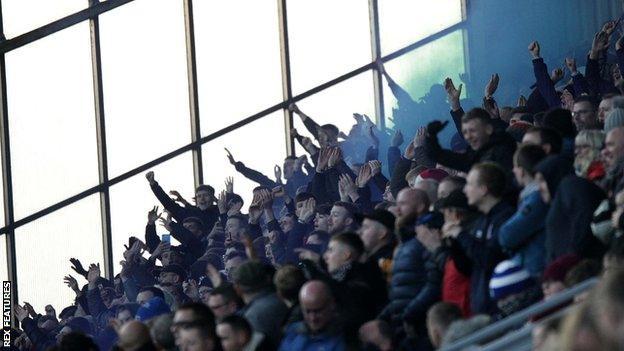How Blackburn Rovers are making Ewood Park accessible to diverse local community
- Published

Blackburn Rovers are second in the Championship after 25 games
"We don't want to be seen to be doing anything that's a tick-box exercise in any sense. We want to be doing actual things that will make a difference and I feel like we are doing that at the moment."
Yasir Sufi, integration and development manager at Blackburn Rovers, joined the club in January 2020 to help make matchdays more inclusive to the local community.
Soon after, the pandemic hit, and it is only this season that Sufi has been able to enact a plan to attract more fans from the local south Asian community to games.
"From my perspective, it's how can we make the football stadium representative of the town and its demographic especially," he told BBC Radio Lancashire.
"The ethnic minority communities were 33% [of the population] three years ago in Blackburn and Darwen, but that isn't how the football stadium is represented on a matchday.
"I want to try and enhance that as much as possible and try and make Ewood Park and Blackburn Rovers as welcoming as possible."
Rovers have been entertaining on the pitch this season, challenging at the top of the Championship table and with Chile international striker Ben Brereton Diaz in fine form.
As the club push for a return to the Premier League for the first time since their relegation from the top flight in 2012, Sufi has pushed to get people from more diverse backgrounds into the stadium.
"I was a kid who grew up in Blackburn and watched us lift the Premier League trophy from a living room because I couldn't get to a match, as my parents had no interest in football at the time," he added.
"I want those children to have the experience and make it as easy as possible for them."
'You have to understand the barriers'
Sufi's work to reach out to the local community has been paying off of late, thanks in part to his own background.
Rovers had 300 people of Muslim faith using the club's prayer room during their match against Huddersfield and received positive feedback from the town's local community.
He said: "You need to understand the barriers to be able to talk to people. You need them to be open and honest with you and feel comfortable with that conversation, as to why they might not come to a game.
"I was able to do that very quickly. I'm Blackburn born and bred, I understand the community and the limitations for them. I run a grassroots club myself and I know the restrictions of those parents supporting those children, even in that environment.
"To come and bring children and watch a game with them, it quite easily translates over. I was able to bring that over with what the barriers are.
"The parents have honest conversations with me. Some of them were quite hesitant in terms of what they had witnessed at football when they were children.
"For them football wasn't part of their lives, but any time I've had a conversation with a child they want to come and watch Blackburn Rovers, and they identified with them because that's where they're born."
Allow X content?
This article contains content provided by X. We ask for your permission before anything is loaded, as they may be using cookies and other technologies. You may want to read X’s cookie policy, external and privacy policy, external before accepting. To view this content choose ‘accept and continue’.